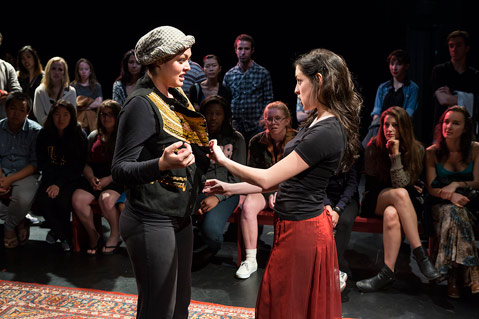Review: The Arabian Nights at UCSB’s Performing Arts Theatre
UCSB Stages Mary Zimmerman Play in Promenade Style on May 9

This ambitious production takes as its points of departure two compelling aspects of contemporary theater. From playwright Mary Zimmerman comes a powerful reimagining of the tales of 1,001 nights, the Islamic Golden Age compendium that is framed by the dramatic notion that Scheherazade literally escapes death through her storytelling prowess. From a variety of sources, in particular David Byrne and Fat Boy Slim’s hit musical about Imelda Marcos, Here Lies Love, comes the concept of promenade staging, in which the audience, rather than sitting in one place, stands and moves through the theater and even across the stage in order to experience the play. Director/sound designer Jeff Mills brings a wealth of relevant experience to the task, and dramaturge Sahar Sajadieh has done a wonderful job of fine-tuning the cast’s approach to the many potentially unfamiliar cultural references that appear throughout the script. Mariah Goolsby is a great and memorable Scheherazade, and there are several other performances that also stand out, including Emily Newsome’s portrayal of Dunyazade, Soren McVay’s wacky Jester, Maria Fuentes’s turn as the Lover, and Morgan Altenhoff’s saucy rendition of the character known simply as Perfect Love. Other featured players include Dana Fox Ortner as the improbable Sympathy the Learned, Lea Culver as the Green Grocer, and Samantha Cuellar as the Pastry Cook.
As in Zimmerman’s other scripts based on canonical literature, the emphasis falls on what’s been neglected or underappreciated by previous iterations. These are not the tales from The Arabian Nights that you are used to, at least not if you aren’t in grad school studying Islamic literature. What they are is challenging, both as literature and as theater. While some tales involve classic folk themes, such as cuckoldry and flatulence, others explore more sophisticated, seemingly literary domains, like misrepresentation in courtship and arranged marriage. Mills’s direction worked best when things were at their most carnivalesque, as when a character seeks to undo an unfavorable marriage by enlisting a crowd of strangers to portray his crazy relatives in a grotesque (and very funny) “family dance.” Later, when the themes turned darker and the script began to pick up on its tales’ resonance with the many voices competing to be heard in the Arab world today, this zany streak shifted its aspect to suggest something more sinister.
Ultimately, the combination of The Arabian Nights with the promenade approach yielded mixed results. As well suited as the material may have been to this form of presentation, the show was too long for people to remain standing comfortably the whole way through. The first 40 minutes were thrilling, but after a 90-minute first act, my sense was that it was hard even for the yoginis in the audience to return to stand for the second half. The mobile benches helped, but they were only capable of accommodating a third of the spectators at any given time, leaving the rest of us on our feet from 8 p.m. until well after 10. Not to take anything away from the dramatic achievements here, which are considerable, but given what I observed on opening night, this may be a case of too much of a good thing.



